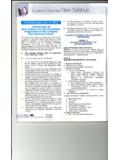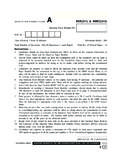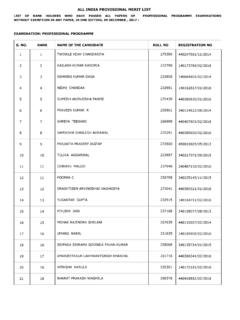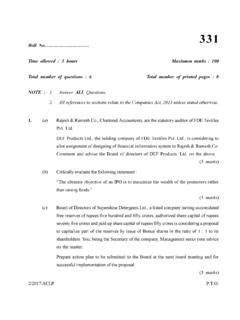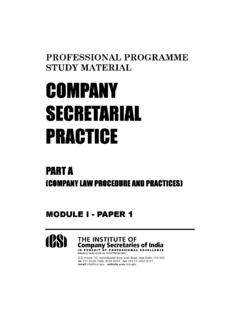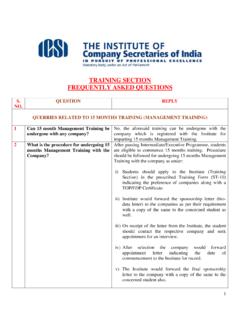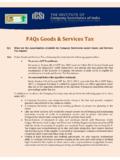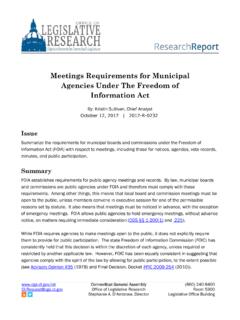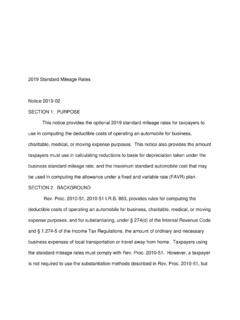Transcription of GUIDANCE NOTE ON MEETINGS OF THE BOARD OF …
1 GUIDANCE NOTE ON. MEETINGS OF THE BOARD OF DIRECTORS. The Secretarial Standard on MEETINGS of the BOARD of Directors (SS-1), formulated by the Secretarial Standards BOARD of the Institute of Company Secretaries of India (ICSI) and issued by the Council of the ICSI, has been approved by the Central Government. Adherence to SS-1 is mandatory in terms of sub section (10) of Section 118 of the Companies Act, 2013 (Act). SS-1 applies to MEETINGS of the BOARD of Directors and its Committees, in respect of which Notices are issued on or after 1st July, 2015. SS-1 prescribes a set of principles for convening and conducting MEETINGS of the BOARD of Directors and matters related thereto. This GUIDANCE Note sets out the explanations, procedures and practical aspects in respect of the provisions contained in SS-1 to facilitate compliance thereof by the stakeholders. BACKGROUND. The Act empowers the BOARD to exercise all such powers, and to do all such acts and things, as the company is authorised to exercise and do, except those powers which can only be exercised or done by the company in a General Meeting.
2 The powers of the BOARD are however, subject to the provisions contained in that behalf in the Act, other statutes, as well as the Memorandum and Articles of Association of the company or any regulations not inconsistent therewith and duly made thereunder, including regulations made by the company in General Meeting (Section 179 of the Act). All the powers vested in Directors are exercisable by them collectively, acting together, unless such powers have been delegated to one or more Directors by the BOARD . The BOARD may also delegate any of the powers exercisable by it to a Committee of Directors. The Articles of Association of the company or members of the company in a General Meeting may also authorise any of the Directors or a Committee of Directors to exercise such powers as may be authorised by means of a Resolution passed at a General Meeting. 1. 2 GUIDANCE NOTE ON MEETINGS OF THE BOARD OF DIRECTORS.
3 Powers to be exercised at BOARD MEETINGS The BOARD of Directors of a company shall exercise certain powers on behalf of the company only by means of Resolutions passed at a Meeting of the BOARD and not by a Resolution passed by circulation. A list of powers of the BOARD to be exercised at the BOARD Meeting is given in Annexure IA. Powers to be exercised by unanimous consent Certain powers of the BOARD shall be exercised by Resolutions passed at MEETINGS , with the consent of all the Directors present at the Meeting. A list of powers of the BOARD to be exercised by Unanimous Consent is given in Annexure IC. Powers to be exercised subject to passing of Special Resolution at General Meeting Certain powers of the BOARD are exercisable by the Directors only with the consent of the company by way of a Special Resolution passed in a General Meeting. A. list of powers to be exercised subject to passing of Special Resolution at General Meeting is given in Annexure ID.
4 Powers to be exercised subject to other approvals There are several powers in the realm of day-to-day management of the company which the BOARD should exercise subject to the approval at the General Meeting or by the Central Government or by the National Company Law Tribunal (NCLT) /. Company Law BOARD (CLB) or subject to the requirements of other Statutory Authorities and/or Regulators. An illustrative list of such powers is given in Annexure IE. Delegation of Powers The BOARD may, by a Resolution passed at a Meeting, delegate certain powers to any Committee of Directors, the Managing Director, the Manager or any other principal officer of the company or in the case of a branch office of the company, the principal officer of the branch office, on such conditions as it may specify. [First Proviso to sub-section (3) of Section 179 of the Act]. A list of such powers is given in Annexure IF. Subject to the provisions of the Articles of the company, the BOARD may delegate any of its powers to Committees with or without such restrictions and limits as may be imposed.
5 For example, a company may incorporate a Regulation in its Articles which reads as follows: (1) The BOARD may, subject to the provisions of the Act, delegate any of its GUIDANCE NOTE ON MEETINGS OF THE BOARD OF DIRECTORS 3. powers to Committees consisting of such member or members of its body as it thinks fit. (2) Any Committee so formed should, in the exercise of the powers so delegated, conform to any regulations that may be imposed on it by the BOARD . However, the Committee cannot further delegate any of its powers to a sub- committee or to a member of the Committee, unless authorised to do so. In addition, powers may also be delegated by the BOARD to one or more Director(s). or to employees of the company or to others not in the employment of the company (such as powers delegated to employees of the holding or subsidiary company, powers delegated to employees of group/associate companies, etc.). The authority to delegate any power to a Committee or any other person shall not be in contravention of any of the provisions of the Act and of the Memorandum or Articles of Association of the company or the requirements of any regulatory body.
6 The scope of the authority given may be limited by the BOARD and conditions may also be attached thereto. INTRODUCTION. The fundamental principles with respect to BOARD MEETINGS are laid down in the Act. SS-1 facilitates compliance with these principles by endeavouring to provide further clarity where there is ambiguity and establishing benchmark standards to harmonise prevalent diverse practices. For the benefit of companies, SS-1 provides necessary flexibility in many cases viz. with respect to calling Meeting at shorter Notice, transacting any other business not contained in the agenda and passing of Resolutions by circulation. Complying with SS-1 ensures a reliable BOARD process which protects the interests of the company and its stakeholders. Incidentally, it has been observed that the quantum and propensity for litigations or risk thereof is directly proportional to the degree of non-adherence to proper procedures and the non-availability of proper records, especially in the case of small and private companies.
7 The objective of SS-1 is to address such issues. SS-1 requires Company Secretary(ies) to oversee the vital process of recording and facilitating implementation of the decisions of the BOARD . Where there is no Company Secretary in the company or in the absence of the Company Secretary, any Director or other Key Managerial Personnel (KMP) or any other person authorised by the BOARD for this purpose may discharge such of the functions of the Company Secretary as given in SS-1. SS-1 does not seek to substitute or supplant any existing laws. It strives to supplement such laws for promoting better corporate governance. 4 GUIDANCE NOTE ON MEETINGS OF THE BOARD OF DIRECTORS. Therefore, in addition to SS-1, the requirements laid down under any other applicable laws, rules and regulations need to be complied with. However, in case of variations in any provision of the applicable laws and SS-1, the stricter provisions need to be complied with.
8 APPLICABILTY OF SS-1. In terms of sub-section (10) of Section 118 of the Act, every company is required to observe SS-1. SS-1 is thus applicable to the MEETINGS of the BOARD of all companies incorporated under the Act, including private and small companies, except One Person Companies (OPC) having only one Director on its BOARD and such other class or classes of companies which are exempted by the Central Government through Notification. Applicability to companies governed under Special Acts SS-1 is also applicable to Banking Companies, Insurance Companies, Companies engaged in generation or supply of electricity, and Companies governed by any Special Acts, if incorporated under the Act. However, if the provisions of these Special Acts such as the Banking Regulation Act, 1949, the Insurance Act, 1938, etc. applicable to these companies are inconsistent with SS-1, then the provisions of such Special Acts shall prevail.
9 Applicability to MEETINGS of the Committees SS-1 is also applicable to the MEETINGS of Committee(s) of the BOARD , whether constituted voluntarily or in compliance with requirements of a statute, of all companies incorporated under the Act, unless otherwise stated in SS-1 or stipulated by any other applicable Guidelines, Rules or Regulations. SS-1 is applicable to MEETINGS of the Committees only if: (a) all the members of the said Committee are Directors members of the BOARD of the company; and (b) the Committee has been constituted by the BOARD , whether statutorily or otherwise. Therefore, in the event there is any Committee constituted by the BOARD voluntarily, in which any Non-Director such as a Chief Executive Officer or a Manager or any other Key Managerial Personnel (KMP) or any other senior manager or officer of the company is a member, SS-1 is not applicable to the MEETINGS of such a Committee. GUIDANCE NOTE ON MEETINGS OF THE BOARD OF DIRECTORS 5.
10 Applicability of provisions relating to Independent Directors All the provisions in SS-1 relating to Independent Directors are required to be complied with by companies which are not statutorily required to appoint Director (s) as Independent Directors but have done so voluntarily. Effect of subsequent changes in the Act SS-1 is in conformity with the provisions of the Act. However, if due to subsequent changes in the Act, a particular Standard or any part thereof becomes inconsistent with the Act, the provisions of the Act shall prevail from the date of change or such date as the change to the Act specifies in this respect. Moreover if any stipulation contained in SS-1 is derived from any provision of law or rule and if such provision is declared inapplicable to any class of companies, such stipulation shall not apply to such class of companies. The Ministry of Corporate Affairs (MCA), Government of India, in exercise of its powers conferred by clauses (a) and (b) of sub-section (1) of Section 462 and in pursuance of sub-section (2) of the said Section of the Act has issued Notification Nos.

